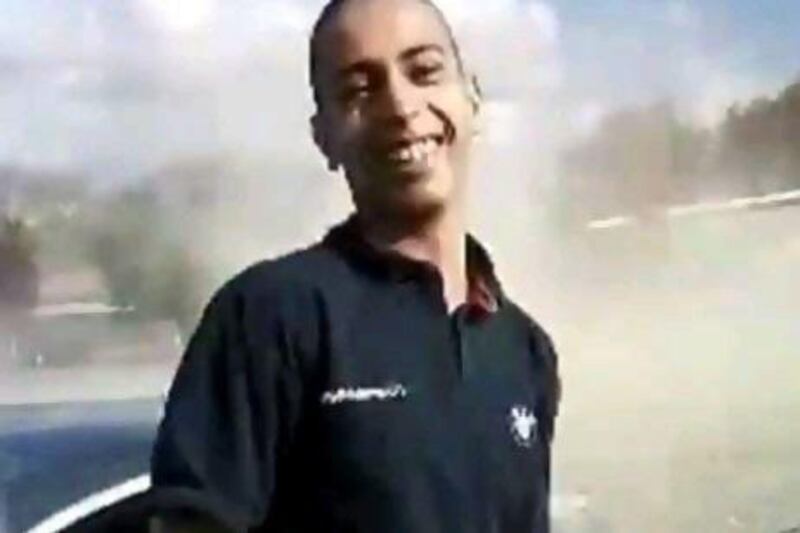MARSEILLE, FRANCE // Mohamed Merah, the self-proclaimed killer of seven people including three children, died as he wished yesterday - defiant to the end as French police stormed his apartment after a 32-hour siege.
The 23-year-old French-born petty criminal of Algerian origin was shot in the head as he leapt from a window of his flat during a gun battle in Toulouse in southern France.
Merah had justified his crimes - and further attacks he was planning - by declaring he was acting in the name of Islam as a member of Al Qaeda.
Although this was indignantly rejected by Muslims in France and beyond, the French president, Nicolas Sarkozy, announced his intention to make it punishable by law to visit websites "that glorify hate and violence" or to travel abroad for extremist training.
He said the spread of violent ideology in prisons - said by officials to be a factor in Merah's radicalisation - would also be challenged.
Islamists linked to Al Qaeda in the Islamic Maghreb admitted responsibility for Merah's killings and demanded that France "reconsider its policies hostile to Muslims". The group described Merah as "Youssef the French man … a knight of Islam".
Muslim leaders roundly condemned the shootings. They warned against confusing the actions of a violent minority with the views of the overwhelming number of Muslims who wanted to live in peace.
Automatic gunfire rang out in the assault by an elite police branch, called Raid, on the first-floor flat in which Merah had been holed up since the early hours of Wednesday.
A camera robot was used to check each room of the apartment. When it entered the bathroom, where Merah had taken cover, he leapt from a window, still holding two guns and firing. He was found dead on the ground.
The French interior minister, Claude Guéant, later described a gun battle of great ferocity, with 300 rounds fired.
Twelve hours earlier, Merah had broken off contact with police negotiators and said he would not surrender but preferred to die "with weapons in my hands" and kill police officers in the process.
A series of grenades exploded during the night and yesterday morning, blowing out windows and shutters in the apartment as police tried to intimidate Merah and persuade him to give himself up without further bloodshed.
Mr Guéant had insisted throughout the siege that the firm desire was to take him alive.
Despite twice promising, according to the officials, to surrender, it now seems clear Merah had no intention of doing so.
The deadly exchange of fire in a normally quiet residential area brought an end to 12 days of violence that began when Merah shot dead a soldier he had arranged to meet in Toulouse on the pretext of wanting to buy his motorbike.
Four days later, he rode his high-powered, stolen scooter to a paratroopers' base at Montauban, 46 kilometres away, and murdered two soldiers and wounded a third as they used a cash machine. All three murdered soldiers were of north African origin, two Muslims and a Catholic, and the injured serviceman is black of French Caribbean origin.
On Monday, in a crime that shocked the world and united Muslims and non-Muslims in disgust and grief, he killed three children, aged 4 to 7, and the father of two of them at the entrance to a Jewish school four kilometres from his home.
In his pronouncements after being cornered in his apartment, and in a call to France 24 television shortly before the siege began, Merah spoke of avenging the deaths of Palestinian children and punishing France for military deployment in Afghanistan and the ban on Muslim women wearing the niqab.
Prosecutors said he had described his objective as "bringing France to its knees".
They said he had spoken of being given training in the militant stronghold of Waziristan in Pakistan, close to the Afghan border.
His movements brought him to the attention of French intelligence. Questions are now being raised about the response to the threat he is now known to have posed, although ministers have said no firm information was available in time to prevent the shootings.
Mr Guéant said many people came to the attention of intelligence services because of links, views or activities that aroused suspicion but did not warrant arrest.
Security sources said Merah was questioned about trips to Afghanistan and Pakistan but that his explanation - that he was on holiday and had the photographs to prove it - was accepted.
Security commentators seemed divided on whether Merah acted as a "lone wolf" or had active support from a network. Urgent attempts are being made to establish how he acquired high-powered weapons, including a Kalashnikov assault rifle and Uzi sub-machinegun.
The Paris prosecutor François Molins, who is in charge of three separate murder investigations resulting from the campaign of violence mounted by Merah in Toulouse and Montauban, said: "He said he always acted alone."
Mr Molins said he had also expressed no regret except for not having killed more people.
The investigation, he said, would examine whether Merah acted alone or with the support of a cell and examine his professed membership of Al Qaeda. Mr Molins said it appeared he had undergone a process of "atypical Salafist self-radicalisation".
The local press in Toulouse reported that Merah had tried to indoctrinate other young French people of Maghrebin origin, showing them videos of beheadings and other violent scene.
But some acquaintances spoke of young man who was friendly and unremarkable apart from his frequent brushes with the law.
In his rambling exchanges with negotiators before contact ended on Wednesday night, Merah finally displayed a significant change of attitude, according to Mr Guéant.
Having previously said he did not possess "the soul of a martyr", he told police he refused to be tried in court and preferred to die in combat: "If it is me that is killed, I will go to heaven. If it is you, too bad for you."







